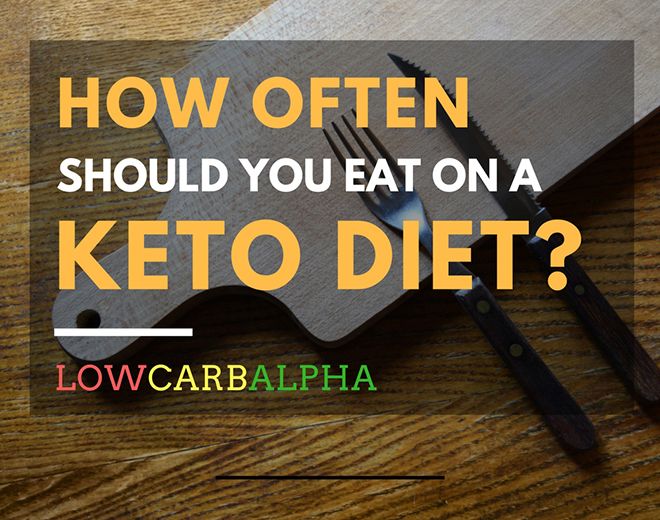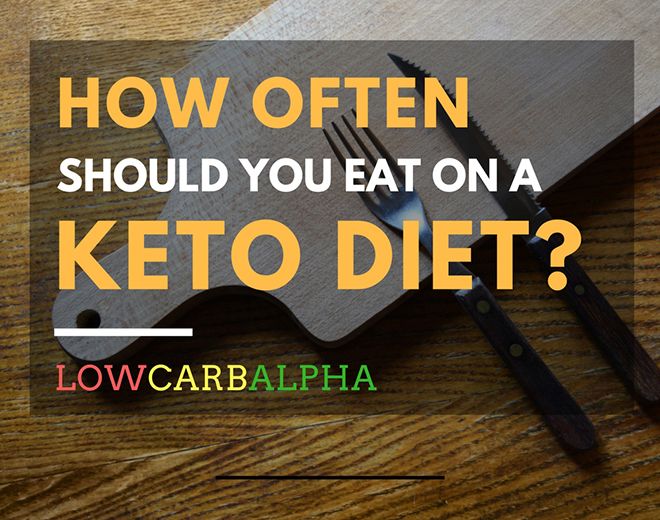
Do not eat carbs in the evening or before bed! Everyone has probably heard something similar to this if following a low carb diet.
Commonly, the view that eating food late in the day is counterproductive if you want to lose weight.
You may also have heard the saying eat breakfast like a king, lunch like a prince and dine like a pauper. But is that actually true and how does that fit in with a ketogenic lifestyle?
A great question for keto, low carb, Paleo or any variety of diet is, does the time you eat meals influence your weight or body fat?
There is much misinformation when it comes to meal regularity. An important thing to master on a ketogenic diet is not so much when to eat but taking in the correct amount of macros.
Here we will look at meal timing, meal frequency and its effect on weight loss on a LCHF diet.
What is your Defining Goal?
When thinking about meal frequency and keto, you must look at your particular circumstances.
Are you looking to lose weight, live a healthier lifestyle and when do you eat your main meals?
Some people eat with colleagues at work, the family after work while for many it is a different routine every day. There so many options to choose from with meal frequency.
In today’s hectic world we tend to eat far more than we did in previous years. Just 50-100 years ago it would be crazy to eat 6-8 meals per day. It just didn’t happen.

Meal Timing and Weight Loss
When you wake up after going many hours without food, the body needs new energy as fuel for muscles and brain.
If you eat the bulk of your calories in the morning by consuming meals early in the day, you can significantly cut hunger in the evening. It, therefore, restricts the calorie-binging associated with overeating.
By eating in the morning, you can be sure it is processed in the gut faster than eating the same meal in the evening.
Studies show that skipping breakfast leads to inadequate glycemic control and people significantly have a higher body mass than those who eat breakfast.(1)
So, therefore according to science, you should eat the smallest portion of the day in the evening to give your body the chance to digest all the food prior to going to sleep.
Now it does not work for everybody. Many people come home from work and eat their main meal with family while some simply cannot eat food immediately after waking.
What you must try and avoid is snacking and nibbling on foods. The constant feeding of food will keep you in a fat storing mode since you do not consume energy in your cells.
Eating before going to sleep will disrupt production of sleep hormones. As a consequence, your body will effectively burn fat slower, and you will struggle to lose the weight.
Studies show that sleep disturbance, insufficient sleep, and poor sleep quality, may also be a risk factor for obesity and type 2 diabetes.(2)
More Meals to Gain Weight?
The more often you eat, the more chance you have to consume more calories throughout the day.
People in the majority of the world have trained their bodies to be at its most active early morning and afternoon.
We typically wake up get ready and go to school, shopping, work, etc. then come home in the evening to relax.

The set mealtimes we have adapted to is a result of society. Humans are not built to constantly and repeatedly eat all day, especially such high amounts of sugar and carbs.
The notion that hunger is something that should be battled and immediately fixed results from everyday modern life.
Going through a period of hunger is a healthy but also wholly natural process.
It is suggested to shift between hunger and eating periods to give your stomach, liver, and kidneys a chance to rest from digesting food and stimulate metabolism.
It is also worth bearing in mind that studies also show the circadian timing of food intake can contribute to obesity and weight gain.(3)
If you want to lose belly fat or get in shape, then it is may be wise to reduce meal frequency to under 3 meals a day.
On the flip side if your goal is bulk up then you may want to space meals out throughout the day to make it easier to consume enough target macronutrients.
A few daily feeds are beneficial to control eating habits and avoid temptations between meals.
Intermittent Fasting
A unique method of abstaining from food is called intermittent fasting. Although it is making a comeback in the health and fitness community, humans have actually fasted for thousands of years.
In the paleolithic era, man would catch its prey kill it, eat it then go without food until the next the meat came along.
In the modern world, fasting is typically practiced for a period of hours during the day. For example, you would go without food for 16 hours then eat your meals in the remaining 8 hours.
It is not a short-term diet as all you are doing is not eating food. Using an intermittent fasting strategy over a 3 month period can be one of the most effective tactics for getting rid of undesirable body fat while sustaining muscle mass.
Studies show that going extended periods without food can have huge effects on the health of your body. It can help with weight loss, type 2 diabetes prevention, Alzheimer’s disease and cancer prevention and treatment.(4)(5)(6)
Fasting triggers autophagy by calorie restriction. Autophagy is an important process of the human body responsible for managing cells to stay healthy and efficient.
It is a self-digestive process that both cleanses and detoxifies the cells.
All in all, people are using it merely to improve health, lose a few pounds, and maintain a healthy lifestyle.
How to Implement Fasting into your Daily Schedule
A keto diet lifestyle and fasting more or less work in tandem with each other.
99% of people are already fasting. For example, providing you do not eat immediately before going to bed or after waking up following an 8-hour sleep, you have fasted roughly 10 hours. You have roughly a 14-hour eating window.
It is relatively easy to go 10 hours without food.
The next stages would be working up to an Intermittent fast of 8 hours of eating (16/8) and ultimately ending up with one meal a day.
With one meal a day (omad) you eat all your calories typically under 1-2 hours (22/2).

It is easier than you think to take a break of 16 hours from eating. If you finish eating your last meal 6 pm then your next meal is at 12 pm the following day.
All it takes is skipping an evening snack and breakfast. You can drink tea, water or a morning coffee to keep you going.
If aiming for maximum fat loss on keto then you can gradually decrease your eating time frame a couple of hours at a time.
I simply skip breakfast and drink a teaspoon of apple cider vinegar with fresh organic lemon to decrease inflammation and improve digestion. I then have a light lunch or also skip the meal to leave a feast for the evening.
Eating a LCHF diet with fewer set meals works for me, and although I am not looking to lose weight, it helps keep my metabolism high and in fat burning mode.
It unquestionably is no worse than some fitness, and personal trainers that advise you eat 6-8 meals a day to build muscle.
Whether intermittent fasting is right for you, everyone has to find out for themselves.

Tips for Successful Fasting
Ideally, you want to choose a day to start Intermittent fasting where you have minimal stress and distractions from food.
The beginning is crucial, but it is also vital to learn to eat whole natural, healthy foods 100% of the time.
Eating burger and fries after a night out drinking alcohol is the worse way to use your eating window.
Similarly overeating during meals and potentially eating more calories than you need. You ultimately put the fat loss on hold.
Learn to start slowly and gradually increase.
How Many Meals on a Ketogenic Diet?
To summarise I recommended a simply structured nutrition plan for success.

Setting goals and planning meals in advance helps you adhere to a ketogenic diet particularly if you are just beginning this new found lifestyle.
Due to the satiating effect of protein and fats, it makes it easier to eat less frequently opposed to a high carb high sugar diet.
Try to eat slower and avoid activity while eating. Over time you learn to acknowledge when you have eaten enough food.
If you feel full, do not feel a need to clean the plate. Leave the meal, finish it later or the next day and know you are giving your body a fat burning a boost.
Science and studies indicate meal timing, type of diet and snacking can influence metabolism and body fat.
Eating immediately before going to sleep can also make it more difficult to lose weight as it modifies hormones.
As everybody reacts differently to various diets and fasting, we also experience very different results.
For me and my experience over the years, I have found eating many times a day such as 6-8 is great to pack on muscle and size. While 1-3 meals daily are better for fat loss, weight maintenance and general health.
It is best to have a doctor examine you if you are diabetic, pregnant, on medication, or have an eating disorder and decide to change your eating habits.
How do you optimize your meals for weight loss on a low carb or high-fat diet?
OnKeto.com is a news aggregation service that brings you best of world articles to you for your consumption.
Author: LowCarbAlpha
Author URL: https://lowcarbalpha.com/author/lowcarbalpha/
Original Article Location: https://lowcarbalpha.com/how-many-meals-a-day-on-keto-diet/
